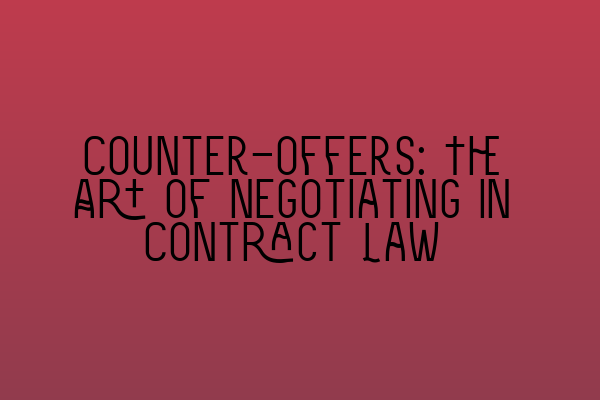Counter-offers: The Art of Negotiating in Contract Law
Negotiating contract terms is a fundamental aspect of contract law. Both parties involved in a contract have their own interests and objectives, and it is through negotiation that these interests can be aligned to arrive at a mutually acceptable agreement. One crucial element of negotiation in contract law is the use of counter-offers. In this blog post, we will explore the art of negotiating through counter-offers and how it can impact the outcome of a contract.
What is a counter-offer?
A counter-offer is a response to an initial offer made by one party. When a counter-offer is made, it essentially rejects the original offer and presents an alternative proposal that modifies or adds new terms to the contract. The counter-offer, in essence, acts as a new offer, inviting further negotiation between the parties.
Key elements of a counter-offer
To understand the concept of counter-offers fully, it is essential to know the key elements that make up a counter-offer:
1. Rejection of the original offer: When a counter-offer is made, the original offer is implicitly rejected. This means that the original offer is no longer valid, and the parties must now negotiate based on the new terms proposed in the counter-offer.
2. Modification or addition of terms: The counter-offer introduces changes or additions to the terms of the original offer. These changes could involve adjusting the price, delivery deadlines, payment terms, or any other aspect of the contract that the parties wish to modify.
3. Communication of intent: It is crucial for the party making the counter-offer to clearly communicate their intention. It should be evident that the counter-offer is in response to the initial offer and that the party making the counter-offer is seeking further negotiation.
The impact of counter-offers on contract formation
Counter-offers have a significant impact on contract formation. When a counter-offer is made, the original offer lapses, and a new offer is created. This means that the party who made the initial offer now has the option to accept the counter-offer, propose their own counter-offer, or reject the counter-offer altogether.
It is important to note that when a counter-offer is made, the party making the counter-offer becomes the offeror, and the party who made the initial offer becomes the offeree. This shift in roles can potentially shift the balance of power and influence the negotiating dynamics between the parties.
Successful negotiation through counter-offers
Negotiating through counter-offers requires skill and strategy. Here are some key points to consider for successful negotiation:
1. Understand the interests and objectives: Before making a counter-offer, it is crucial to thoroughly understand your interests and objectives. This understanding will help you shape your counter-offer in a way that aligns with your goals.
2. Prioritize essential terms: Identify the most crucial terms of the contract and prioritize them in your counter-offer. This will help you focus on the key elements that will make the contract favorable to you.
3. Maintain clear communication: Throughout the negotiation process, it is important to maintain clear and open communication with the other party. Clearly articulate your intentions, concerns, and any proposed changes or additions to the contract.
4. Seek common ground: Look for areas of potential agreement and try to bridge the gap between the parties. Finding common ground can help build trust and facilitate a smoother negotiation process.
5. Be flexible but assertive: Negotiation requires a balance between flexibility and assertiveness. Be open to compromise and make concessions when necessary, but also assert your position firmly to protect your interests.
Conclusion
Counter-offers play a critical role in the negotiation process in contract law. They provide an opportunity for parties to refine and align their interests, leading to a mutually acceptable agreement. By understanding the art of negotiating through counter-offers, you can navigate the complexities of contract law and achieve successful outcomes.
Related Articles:
– SQE Sample Papers: Practice for Exam Success
– Adjusting Strategy Based on Mock Performance: Improving Your Approach
– Effective Revision Techniques for SQE: Maximizing Retention and Recall
– Improving Speed and Accuracy in SQE: Tips for Efficient Exam Taking
– Advantages of Scenario Practice in SQE: Preparing for Real-World Scenarios
